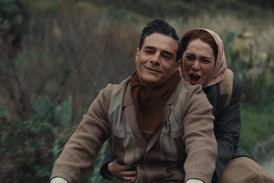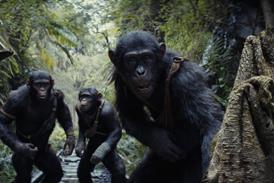Dir: Manuel Nieto Zas. Urug-Arg-Can-Sp.2006. 109mins.
Ahyper-naturalistic portrait of a city slacker living amongst uneducatedlabourers in a sleepy resort town on the Uruguayan coast, La Perrera (The Dog Pound) is a deceptively simple film which,underneath its placid surface, is unsettling and finally shocking. With itslanguid pace and detached point of view, the film will not set the box officealight but it has already been a festival favourite - it won a Tiger Award inRotterdam and played Toronto and San Sebastian this week - and should scoresales to adventurous arthouse distributors as well asslots in showcases of new Latin American cinema.
Director Nieto Zas joins a growing list of new film-makers from SouthAmerica who are casting unsentimental eyes on their surroundings and expressingthemselves with bold, sometimes uncompromising, styles. Like Carlos Reygadas' more accomplished debut movie Japonfrom Mexico, The Dog Pound favours imagery and mood over traditional narrativeand characterization; it's short on dialogue and long on scenes of everydaymonotony. But the cumulative effect of its images, like Japon,is unexpectedly potent.
The film opened in Uruguayin May 2006 and was recently picked up for worldwide sales by London-based OneEyed Films.
Riera plays David, a 25 year-old slacker who has justfailed his university exams in Montevideo and has one year in which to retakethem. Urged on by his frustrated father (Adjemian),who is paying for his education, David moves to the coastal resort where thefamily has a home and starts to build his own house in an isolated plot ofland. His father refuses to give him any more money for his schooling until hecompletes the house.
David, who does little morethan smoke joints and masturbate, is a distinterested youth with little know-how of construction.He finally starts building the (ramshackle) house with the rough sex-starvedlocal men, even though he runs out of money to pay them. But they carry on,excited at the prospect of the arrival of a posse of female students coming tovisit David at the resort with a former girlfriend of his.
However, when the girlfriendarrives with just a transvestite friend in tow, the men grow restless. WhileDavid and his visitors experiment with mushrooms, they christen the new housewith a rowdy drinking party and, like the dogs that accompany them everywhere, gohunting for action.
Nieto Zas,who worked as an assistant director to Pablo Stoll and the late Juan Pablo Rebella on the slacker-themed 25 Watts and the similarlyquirky Whisky, captures a true sense of the primitive not just in the feral menof the coast but in David himself, a directionless, privileged youngster whoseprime goals in life are to get high and get laid. Even though there are momentsat the beginning when David appears like the underdog and his father thebourgeois villain, the balance shifts subtly so that by film's end, David ismore a fool squandering the opportunities which his father worked hard to givehim.
The off-season resort withits bleak beaches, barren overgrown land and preponderance of wild dogs is theperfect bleak location for this kind of story.
Production companies/backers
Control Z Films
Xerxes Indie Films
Rizoma Films
Wanda Vision
Worldwide sales
One-Eyed Films (44) 208 740 1491
Producers
Manuel Nieto Zas
Fernando Epstein
Screenplay
Manuel Nieto Zas
Cinematography
Guillermo Nieto
Production design
Agustina Ghiarino
Editor
Fernando Epstein
Music
Buenos Muchachos
Flor Maleva
Main cast
Pablo Riera
Martin Adjemian
Sergio Gorfain
Sofia Dabarca
Adriana Barboza



















No comments yet